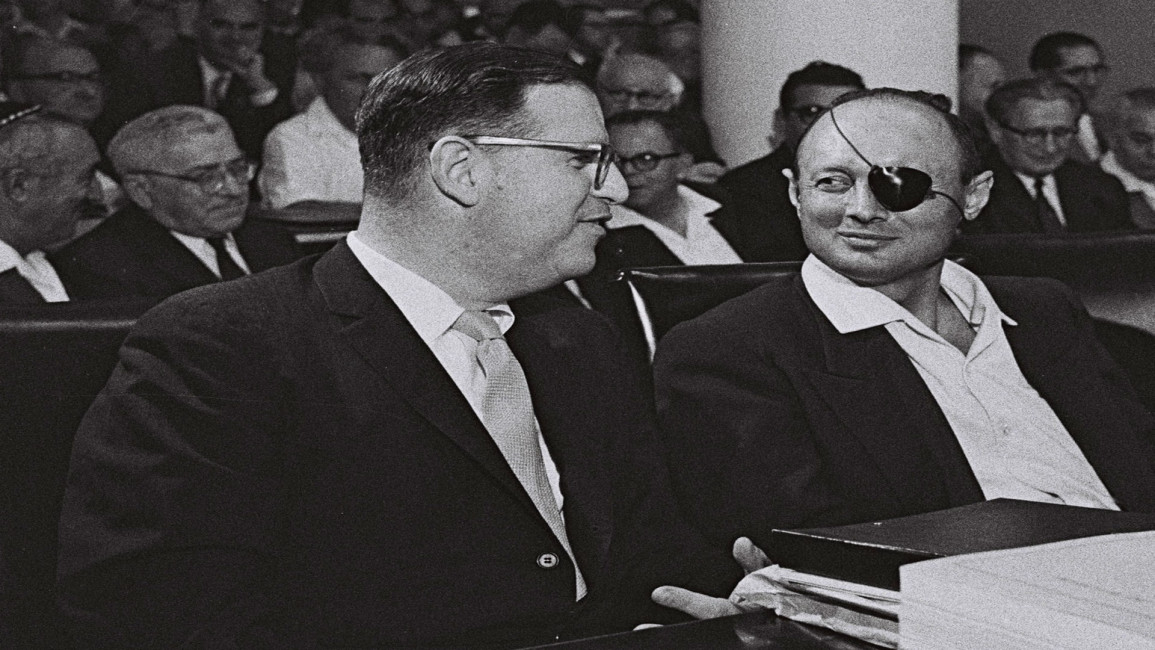
The Muslim Brotherhood and Moshe Dayan
This is a statement made by a person who occupies the position of Egyptian minister of culture, who is part of a long line of "intellectuals" who have pledged their unwavering allegiance to the country's military regime.
This statement is made worse by the fact that the person who uttered it is described as an "enlightened intellectual" - a label increasingly used to describe people who exhibit a heightened phobia of the Muslim Brotherhood, religion and Islam.
| The more intense the prejudice, the faster one climbs through the ranks of "enlightened intellectuals". |
The more intense the prejudice, the faster one climbs through the ranks of "enlightened intellectuals".
The minister of culture's comparison between the Muslim Brotherhood and Moshe Dayan, the famed Israeli military leader, is indicative of the abysmal state of intellectuals in Egypt.
The minister - who presents himself as a historian - has not only fabricated history, but also whitewashed one of the worst Israeli war criminals, who was responsible for the death of thousands of Egyptians throughout the 1950s, 1960s and 1970s.
We can excuse the minister's deep-seated hatred towards the Muslim Brotherhood, for whatever reason that may be. Perhaps they ignored his genius during their rule or perhaps he is genuinely ideologically opposed to the group.
However, it is completely inexcusable for the man to go as far as falsifying history to strip the Brotherhood of any degree of nationalist credentials and favour a bloodthirsty racist like Moshe Dayan who headed the Zionist gangs in the 1956 war and was minister of defence during the 1967 war.
Demonising the Brotherhood
The minister's statement is part of a general discourse of demonising the Muslim Brotherhood that must surprise even the Israelis who the Brotherhood have been compared with during the past two years.
Many "regime intellectuals" take their hatred and animosity towards the Brotherhood and Islamists in general to unprecedented levels, which is not a mere extreme opinion but a calculated statement that has political objectives.
The comparisons between the Brotherhood and Israelis has been repeatedly churned out by the media and taken root in segments of the population in order to justify the brutal repression of the group.
A new "collective memory" is being created in Egypt, such as the one created decades ago in which Palestinians were to blame for giving their land to the Zionists.
This is certainly not an attempt to exonerate the Muslim Brotherhood from the many mistakes that they have made and continue to make, neither is it an attempt to disregard legitimate opposition to their thought and ideology.
However, what is happening today has goes beyond criticism to the point of justifying their oppression and murder.
It has reached the point of falsifying their history and challenging their affiliation to Egypt as citizens of the country.
| The 'regime intellectual' is willing to go to the farthest extremes in order to falsify history in the service of the state's narrative. |
Appeasing the regime
Legitimising the oppression of the Brotherhood has led to the deepening of the hostile discourse against them, and the hostility towards the Brotherhood has become proof of patriotism and loyalty to the military regime.
In other words, some intellectuals in Egypt believe that by demonising the Brotherhood, they are getting closer to the regime and increasing their chances of share of power given their fight against "obscurantism".
Consequently, the more they defend this imagined "enlightenment", the more the regime commits crimes against the Brotherhood and other Islamists, as long as there are those who justify, encourage and bless this oppression.
In his attempt to prove his loyalty to the military regime and the ruling general, who has become one of Tel Aviv's closest allies, the "regime intellectual" is willing to go to the farthest extremes in order to falsify history in the service of the state's narrative.
When a minister uses such language, the matter surpasses the mere expression of a personal opinion and reflects the position of the state and its institutions towards the Muslim Brotherhood as individuals and not just a political party.
While the regime's position towards the Brotherhood has been known and explicit ever since they were overthrown two years ago, the minister's statement is a crime against the country - and against history.
Dr Khalil al-Anani is an adjunct professor at Johns Hopkins University's Paul H Nitze School of Advanced International Studies and a Senior Fellow at the Middle East Institute. He is a leading academic expert on Islamist movements, authoritarianism and democratisation in the Middle East.
Follow him on Twitter: @khalilalanani
Opinions expressed in this article do not necessarily represent those of al-Araby al-Jadeed, its editorial board or staff.
This is a translation from our Arabic edition.




